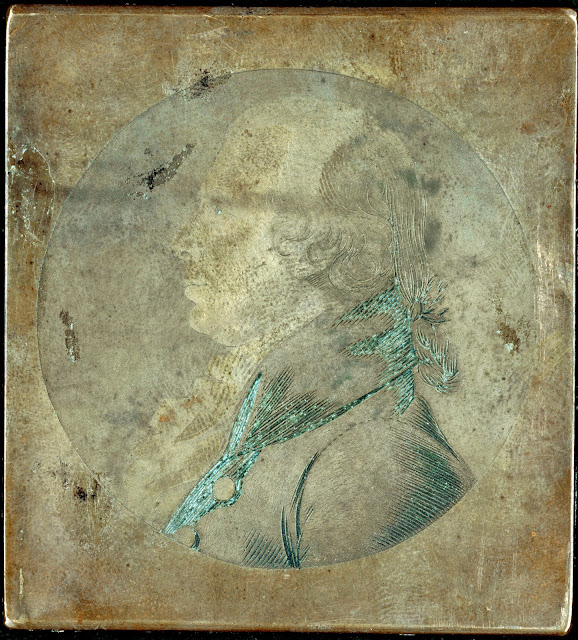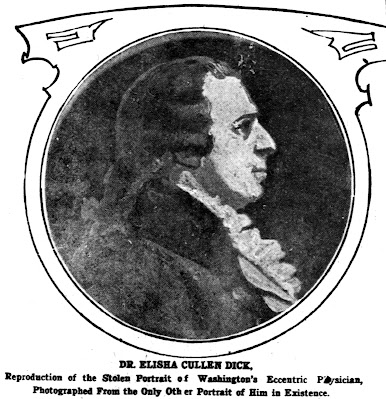This 1805 engraving of Dr. Elisha Cullen Dick by Charles Balthazar Julien Fevret de Saint-Mémin belongs to the Library of Congress. The Library even has the copper plate from which it was printed.
This wood-cut after Saint-Mémin's engraving accompanied a short biography of Elisha Cullen Dick in Thomas Maxwell Potts' 1883 genealogy.
Dr. Dick was a prominent citizen of 18th and early 19th century Alexandria, Virginia. He lead a cavalry company during the Whiskey Rebellion.
On March 28, 1788, Dr. Dick published an ad offering $8 for the capture of his enslaved servant, Ned. See Gay Montague Moore, 1949, page 164.
and this "reproduction" of the stolen portrait, obviously based on the Saint-Mémin portrait above.
He was briefly mayor of Alexandria, DC, (1804-5) and attended Washington's deathbed. He famously sent a poetic invitation to his friend Philip Wanton at 216 Prince Street:
If you can eat a good fat duckCome up with us and take pot luck,Of whitebacks we have got a pairSo plump, so round, so fat, & fairA London Alderman would fightThrough pies and tarts to get one bite.Moreover, we have beef or porkThat you may use your knife and fork.Come up precisely at two o’clockThe door shall open at your knock.The day tho’ wet, the streets tho’ muddyTo keep out the cold we’ll have some toddy.And if, perchance, you should get sick,You’ll have at hand
YoursE. C. Dick
Read Dr. Dick's biography in the Cyclopedia of American Medical Biography, Lamb's History of the DC Medical Society or the Recollections of Samuel C. Busey.
The University of Pennsylvania Libraries own this relatively youthful portrait of Dr. Dick.
I will give the above to any person who will secure in Alexandria Gaol a Negro fellow named Ned, who ran away from me about three weeks ago. He is between thirty and forty years of age, about 5 feet 7 or 8 inches high and was formerly the property of Mrs. Clifford of whom I bought him. Having a wife in Maryland, belonging to Mr. Samuel H. Bean, I imagine Ned will be inclined to make a nightly resort to her quarters. His winter clothes were made of a mixed cloth of a gray color and it is probable he will be found with a soldier's old napsack upon his back in which he carries his provisions.
Dick was one of three physicians at the bedside when George Washington died. He objected to bleeding the former president, and suggested, instead, a tracheotomy be performed. But Drs. Craik and Brown disagreed and Dick deferred to his senior colleagues. When Washington died, it was Dick who stopped the clock to record the time. This fanciful image of Dr. Dick stopping the clock appeared in an ad for Liberty Building Association in 1953.
Who Stopped the Clock?
Dr. Elisha Cullen Dick, of Alexandria, attended George Washington during his fatal illness. At the moment of the First President's death, the doctor cut the pendulum cords of the bedroom clock to mark the time.
Cephas Thompson painted this excellent portrait of Dr. Dick in 1807 or 1808. It resides in the Boston Athenaeum.
E.C. Dick was himself a portrait painter. A portrait of Washington by Dr. Dick hangs at Mt. Vernon. See Dick's portrait of Washington in the Portrait Gallery.
George Washington
by Elisha Cullen Dick
Dick owned several houses in Alexandria including the Dick Janney House at 408 Duke Street, later the home of Kate Waller Barrett and the Murray-Dick-Fawcett house at 517 Prince Street. After his bankruptcy in 1801, he rented a house at 209 Prince Street.
209 Prince Street.
When 209 Prince was for sale in 1946 it was advertised that "George Washington Slept Here." The ad in the Evening Star describes Dr. Dick:
Elisha Cullen Dick -- Physician to George Washington who pronounced him dead. As Master Mason together with George Washington laid the cornerstone of the U. S. Capitol and together with George Washington laid the cornerstone of the City of Washington, the new Federal City.
Dr. Dick was, like George Washington, a mason. The history of Alexandria Lodge 39 on page 29, gives us a look at Dick's masonic career.
He succeeded Washington [as master of Lodge 22] on the 27th of December, 1789, and served until December 27, 1795; and again from December 27, 1797, to December 27, 1799. He presided at the funeral Lodge convened on Monday, December 16, 1799, to make arrangements for the interment of Washington, and on the following Wednesday (18th) performed the interesting ceremonies of the Order at the funeral.On the 22d of February, 1800, Dr. Dick delivered, at the First Presbyterian Church, an oration on "The Day and Decease of Washington." On this occasion the Lodge, accompanied by Brooke Lodge, No. 47, was escorted to the church by the several uniformed militia companies of Alexandria, and a long line of the citizens of the town. A few years before his death, Dr. Dick made his residence at his farm in Fairfax County, Va., near Alexandria. He died in Alexandria in 1825, (“The Lodge of Washington” by Franklin L. Brockett, page 128)
The Evening Star ran this image of Dr. Elisha Cullen Dick in 1940.
Dr. Elisha Cullen Dick,
Who, as master of Lodge No. 22, F.A.A.M. of Alexandria, Va.,
conducted services at the laying of the cornerstone
of the District of Columbia, April 5, 1791.
In 1897, a miniature portrait of E. C. Dick was stolen from the Museum of the Masonic Temple in Alexandria. The Washington Times Magazine, in 1907, had this rendition of the theft.
Stealing Dr. Dick's Portrait from the Museum.
and this "reproduction" of the stolen portrait, obviously based on the Saint-Mémin portrait above.
Dr. Elisha Cullen Dick,
Reproduction of the Stolen Portrait of Washington's Eccentric Physician,
Photographed From the Only Other Portrait of Him in Existence.
The George Washington Masonic Memorial in Alexandria has this stained glass window of Elisha Cullen Dick (photo by Pedro Bernardo)
Elisha Cullen Dick died on September 22, 1825 and was buried in the Quaker burying ground in Alexandria. In keeping with his traditional Quaker values, Dick requested that his grave be unmarked, so its exact location is unknown. In 1937, the old burying ground became the site of the Kate Waller Barrett Branch Library. In January of 1937, the city council voted $5000 annually to support a new library on the location of the old Quaker burial ground (See The Washington Times, Jan. 27, 1837). In December of 1937, the woman's auxiliary to the Medical Society of the District of Columbia dedicated a "tablet" to Elisha Cullen Dick, "on west wall in the old Friends burying ground, on Queen street." (See The Washington Post, December 2, 1937.)
The 1937 plaque that stands in for a head-stone, on the library lawn, gives Dick's birth-year as 1750. His Obituary in the Alexandria Herald puts his birth in 1752. Other sources give Dick's birthday as March 15, 1762. (photo below by Cliff - Find-a-Grave)
Elisha Cullen Dick, M.D.
1750 - 1825
Friend and Physician to
George - Washington
Buried Near this Spot
----
Erected by the
Woman's Auxiliary to the Medical Society
of the
District of Columbia
1937

















No comments:
Post a Comment